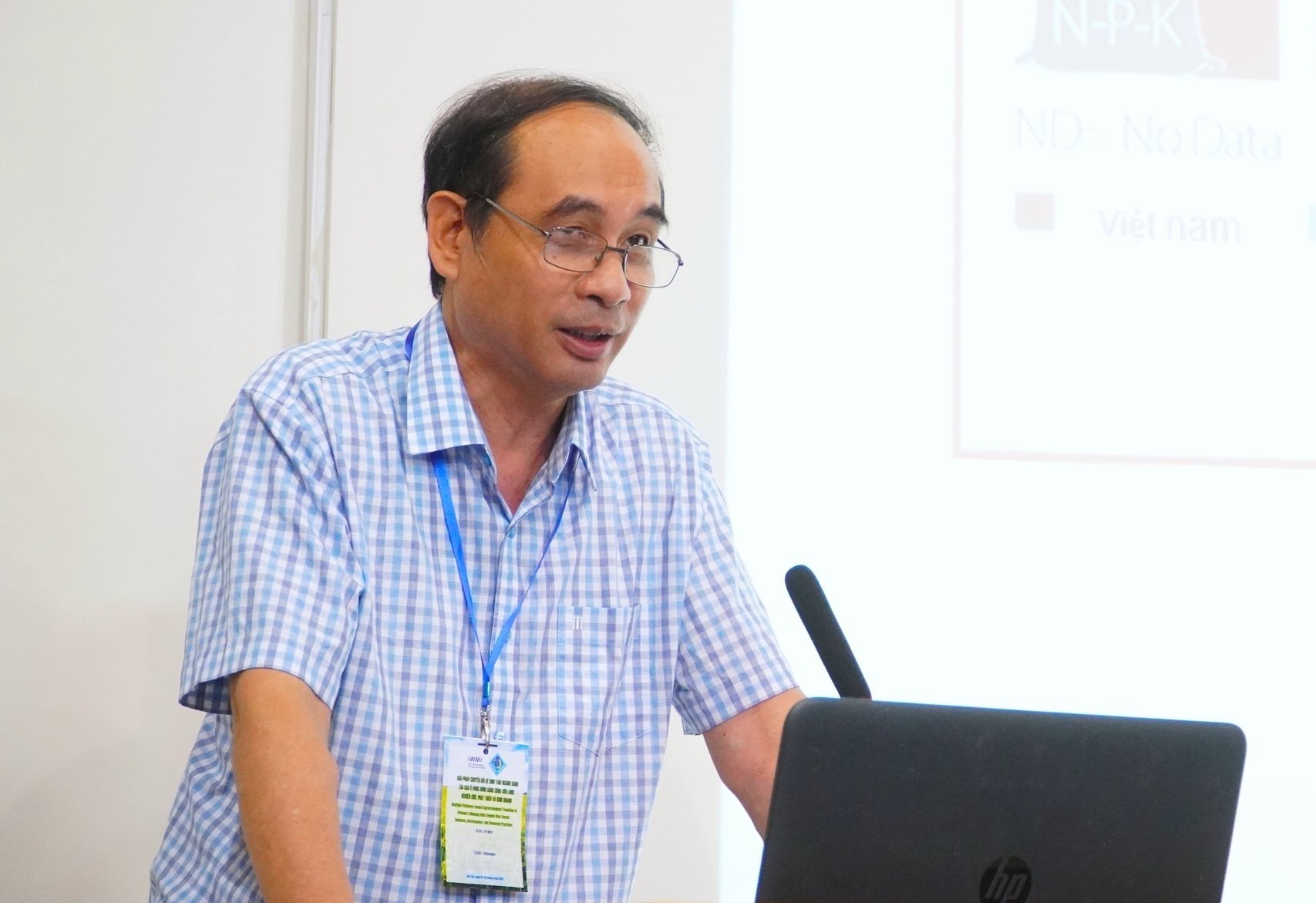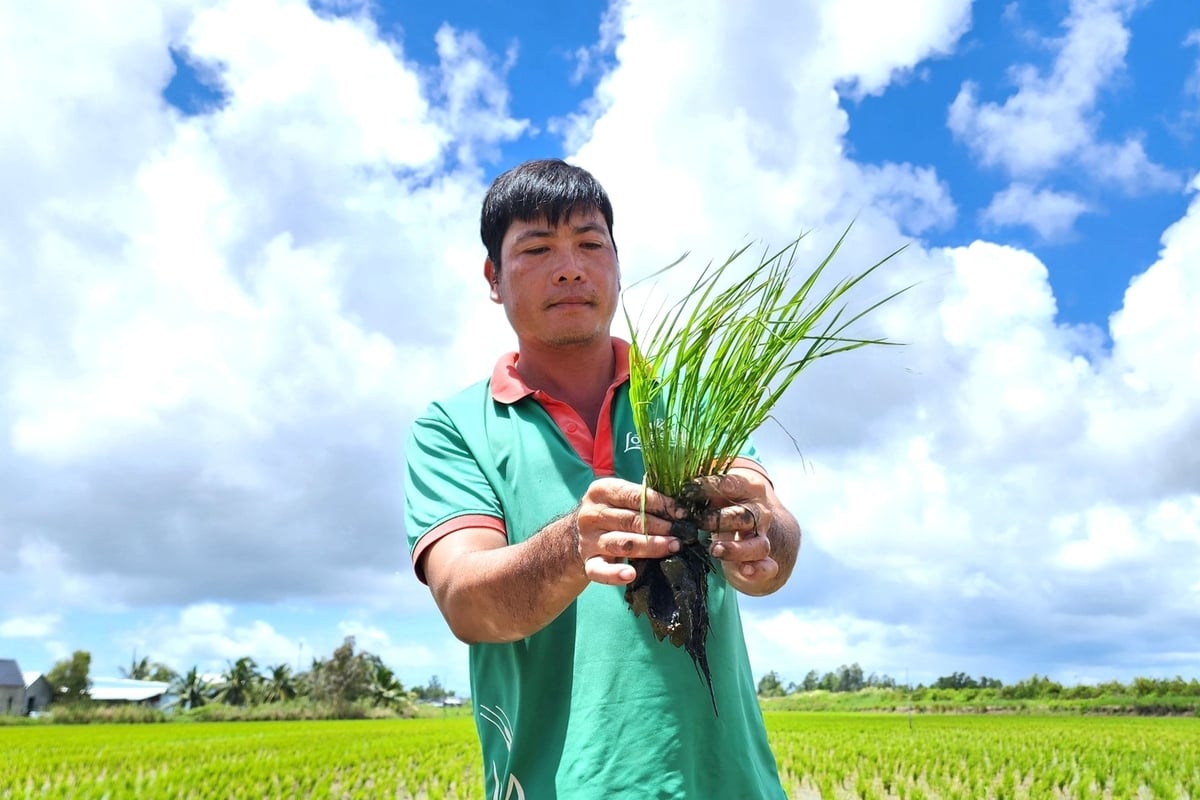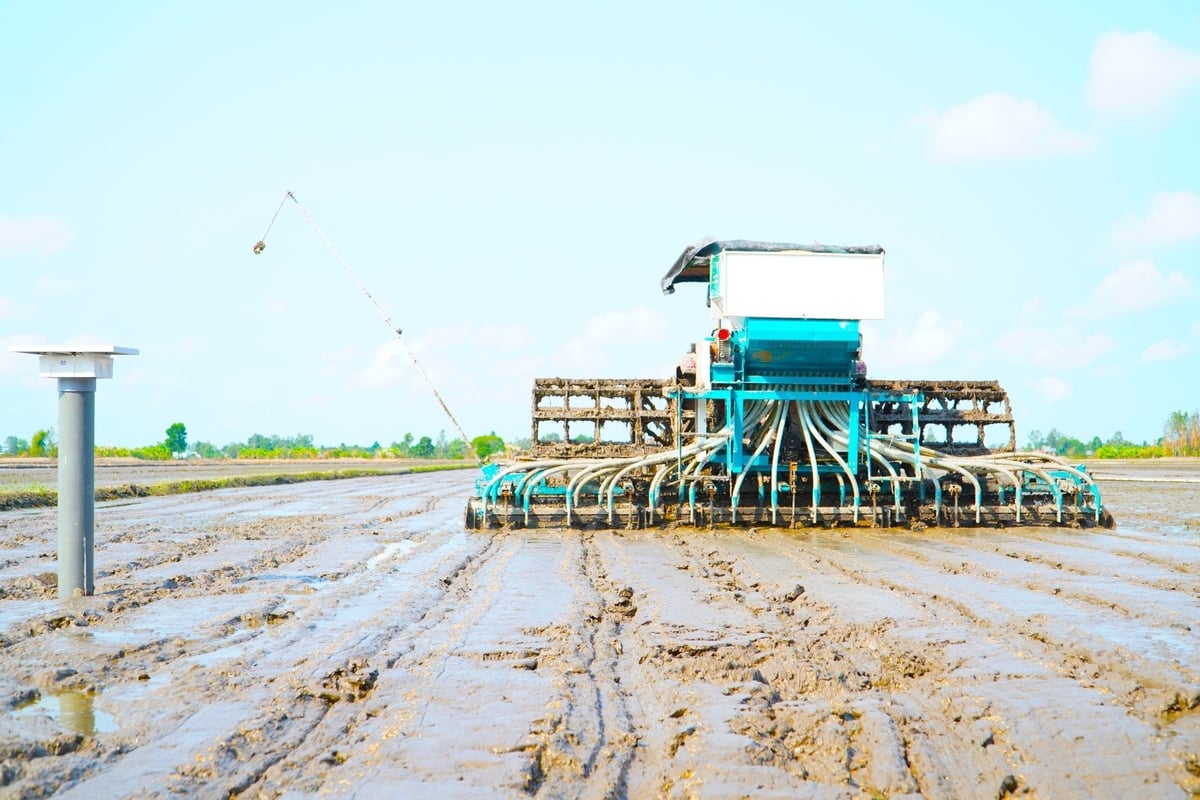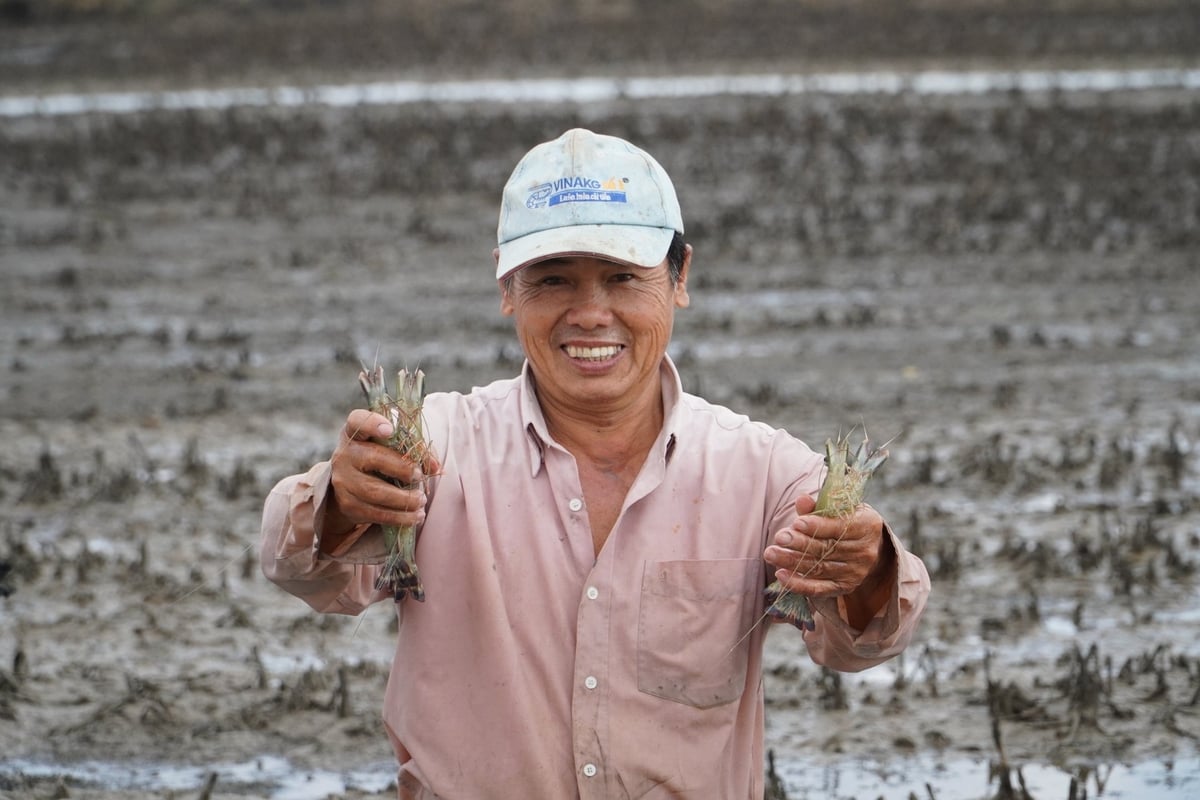December 31, 2025 | 02:04 GMT +7
December 31, 2025 | 02:04 GMT +7
Hotline: 0913.378.918
December 31, 2025 | 02:04 GMT +7
Hotline: 0913.378.918
Amid the increasingly evident impacts of climate change, pressures from international markets, and the need for regional development in the Mekong Delta, the concept of agroecological transition has been frequently emphasized in various programs and projects.
At the recent seminar titled “Solutions for transforming the rice sector ecosystem in the Mekong Delta: Research, development, and business” hosted by Can Tho University, Associate Professor Dr. Dao The Anh – former Vice President of the Vietnam Academy of Agricultural Sciences (VAAS), noted that agroecology is a broad concept encompassing various technical approaches.

Assoc. Prof. Dr. Dao The Anh shares insights on policies and research directions for the transition to agroecology. Photo: Kim Anh
Currently, various projects are being implemented, each with its own technical name such as regenerative agriculture, circular agriculture, low-emission agriculture adapted to climate change, and so on. However, all these concepts ultimately aim toward agroecology with the common goal of efficient production, better product quality, minimal resource consumption, no soil or environmental pollution, ensuring biodiversity, as well as stable income and livelihoods for producers.
For rice, a key commodity in the Mekong Delta, the shift toward agroecology is seen as highly promising. Among the driving forces in this transition are the rice-growing cooperatives. However, differences in scale, management capacity, and readiness among cooperatives pose many challenges during the transformation process.
Dr. Ha Minh Tuan (International Center for Tropical Agriculture – CIAT) analyzed that some large-scale cooperatives with strong financial foundations, concentrated production areas, and stable linkages with enterprises have a higher readiness for transformation. These cooperatives are motivated by transparent purchase contracts, higher selling prices, support with machinery and technology, and brand building. Additionally, they have adopted digital tools to practice agroecology, trace product origins, and optimize production costs.

In the Mekong Delta, more and more organic rice farming models are emerging. Photo: Kim Anh.
On the other hand, most small-scale, micro, or newly established cooperatives face many barriers due to a lack of management capacity. They have yet to clearly envision the specific benefits of the transformation. Even some cooperatives that operate effectively under integrated rice–aquaculture models struggle to expand their markets due to a lack of certification and heavy dependence on fluctuating prices. This situation leads to resistance to change among farmers, especially because of the high initial investment costs.
Additionally, according to Dr. Ha Minh Tuan, there is a notable lack of widely recognized ecological rice brands. This results in sustainably produced rice products lacking a clear competitive advantage.
Furthermore, financial constraints become a major bottleneck, as most cooperatives do not have the capacity to invest in machinery, digital tools, production systems, brand building, or cover the costs of international certifications such as VietGAP, SRP, or organic standards.
Experts from CIAT believe that one of the key breakthroughs to accelerate the transition to agroecology is the establishment of appropriate financial mechanisms. Dr. Ha Minh Tuan proposed the creation of an Agroecology Transition Fund based on a public–private co-financing model.
This solution draws on lessons from initiatives such as AgriFI – the EU’s Agricultural Finance Initiative; the AGRA Risk-Sharing Fund supported by the Alliance for a Green Revolution in Africa; and agroecology support programs by NABARD in India.

1 Million hectares of high-quality rice project is a testament to the transition toward agroecology in the rice sector of the Mekong Delta. Photo: Kim Anh.
Accordingly, product offtake contract can be used as collateral for loans, helping cooperatives address cash flow issues, make timely payments to farmers, and invest in long-term development. Investment packages should also be tailored to suit the specific conditions and readiness levels of each cooperative.
Regarding policy, Associate Professor Dr. Dao The Anh noted that Vietnam has introduced a number of agroecology transition policies in recent years. These include the 1 Million hectares of high-quality, low-emission rice project in the Mekong Delta; National plan for the development and use of biological plant protection products to 2030, with a vision to 2050; National biodiversity conservation strategy; Integrated plant health management (IPHM) development program to 2030; and National action plan for transparent, responsible, and sustainable food systems to 2030.
However, according to Dr. Dao The Anh, the challenge lies not in the lack of policies but in the gap between policy and implementation. To bring policies into practice, strong inter-sectoral coordination is needed, along with active participation from local governments, and support from businesses, research institutions, and regional initiatives.
Specifically, to achieve the goal of agroecological transformation, the Ministry of Agriculture and Environment should coordinate with relevant sectors, provinces, and cities, along with support from international organizations and the private sector, to develop a national action plan. This includes fostering collaborative research and promoting nature-friendly production systems through soil improvement and ecosystem restoration activities.

The transition to agroecology must ensure income and livelihoods for farmers. Photo: Kim Anh.
Cooperatives need training and capacity building in business planning, financial management, and market negotiation. The use of digital tools like Facefarm and the Mekong App should be expanded and enhanced with features such as traceability, weather alerts, and emission tracking to support synchronized and sustainable farming practices among members.
Establishing stable markets for agroecological products is equally important. Communication campaigns should raise consumer awareness of the added value of eco-friendly rice, not only clean and safe but also contributing to environmental protection, emission reduction, and resource conservation. Ecological rice cooperatives should be supported in branding, and connected to retail chains, supermarkets, high-end restaurants, and export markets.
Youth engagement in agroecology should be encouraged through innovative business models such as digital agriculture, eco-agricultural tourism, and organic production linked to e-commerce. This not only increases income but also addresses the shortage of young labor in agriculture.
A true agroecology movement will only take shape when researchers, development organizations, and farming communities share a common understanding, act together, and invest collectively.
Currently, several agroecological solutions are being implemented in the Mekong Delta, such as: alternate wetting and drying (AWD) irrigation; applying the "one must - five reductions" approach in rice production; climate risk mapping for rice cultivation; the Sustainable Rice Platform (SRP); circular straw management; integrated rice-shrimp and rice-fish farming systems; the use of precision fertilization technologies; and agroecological tourism.
Translated by Phuong Linh
/2025/12/29/0829-2-000508_274.jpg)
(VAN) Hai Phong is tightening management, with 100% of fishing vessels licensed and equipped with vessel monitoring systems, joining the national effort to lift the EC's 'yellow card.'
/2025/12/27/2744-1-121716_241.jpg)
(VAN) The Viet Nam Environment Protection Fund is the national environment protection fund and a state financial institution under the Ministry of Agriculture and Environment.
/2025/12/27/2015-2-111213_813.jpg)
(VAN) In efforts to realize the goal of Net Zero emissions, reducing urban emissions is regarded as a key solution.

(VAN) Deputy Prime Minister Tran Hong Ha requested to design the EPR mechanism toward a circular economy that is transparent, feasible, and non-administrative and aligned with actual recycling capacity.

(VAN) On December 24, Deputy Prime Minister Tran Hong Ha chaired a meeting about approving greenhouse gas emission quotas for 2025 - 2026 period.

(VAN) As Viet Nam enters a new era, the national agricultural sector must proactively adapt to global trends to transform current challenges into strategic development opportunities.
/2025/12/18/5046-3-154320_307.jpg)
(VAN) Granting planting area codes is a solution that helps Lao Cai manage forests effectively while also laying a data foundation to support the development of the carbon credit market in the future.